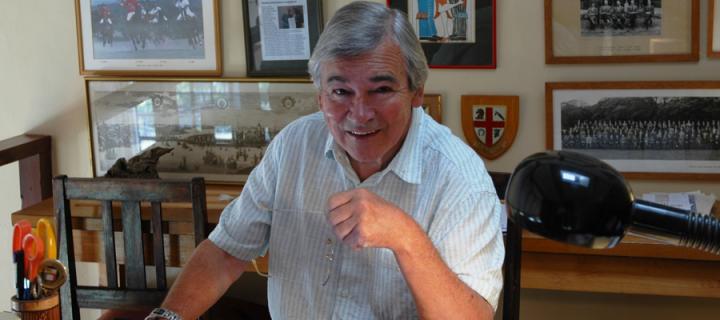Professor Brian Perry
Professor Brian Perry talks about studying at the Dick Vet and a career that has spanned the globe.
| Name | Professor Brian Perry |
| Degree Courses | Bachelor of Veterinary Medicine & Surgery; Diploma in Tropical Veterinary Medicine; MSc Tropical Vet Science; Doctorate of Veterinary Medicine & Surgery |
| Years of Graduation | 1969, 1971, 1975, 1987 |

Your time at the University
I came from a large-scale farming background in Norfolk, and my family always expected I would continue this tradition. However I became fascinated by zoology during my “A” levels, and wanted to do something different, so I applied to different veterinary schools. Before receiving my “A” level results, I was offered unconditional places in both Edinburgh and London (those were the days!), but chose Edinburgh due to the strong reputation it had in veterinary medicine.
We had a very close knit group in our class over the next five years, and of course the Falcon bar near the college became a central port of call.
I was an active member of the Dick Vet rugby club (the Dick fielded 3 rugby teams in those days, and had an annual match against the university squad), and the university ski club (many happy weekend escapes to the Cairngorms), and was involved in the pony trekking society.
After my first degree I had a spell in general practice, before returning to Edinburgh in 1971 to take the DTVM. Subsequently I worked in Ethiopia and in late 1974 again returned to Edinburgh for my MSc. My fourth degree from Edinburgh, a doctorate, was obtained by thesis while working in the USA as a professor, under supervision of the late Gordon Scott at the Centre for Tropical Veterinary Medicine (CTVM) on the Easter Bush complex.
Having been back to Edinburgh many times, I see that it has modernised incredibly, but not changed fundamentally, retaining its compelling charm.
Tell us about your Experiences since leaving the University
After graduating with my BVM&S I spent time in general practice in the west of Scotland, but subsequently after completing my DTVM, I moved to Ethiopia with a British veterinary team helping with the eradication of rinderpest. That sowed the seed for an eventual career in tropical diseases and in agricultural development in various parts of the so-called third world.
After my MSc, we moved to Colombia, where I set up a multi-disciplinary laboratory for sheep diseases, and used it to evaluate the priority constraints affecting small scale farmers in the highlands of the Andes. From there we moved to Zambia, where I ran a national field investigation of the health and production challenges of the so-called traditional livestock sector in the country.
Then I changed track and accepted a post as a professor in the newly established veterinary school in Virginia, USA, teaching epidemiology and public health, but still managing to undertake research projects in Africa, the middle east and Latin America. My last move of country, at least as far as residence was concerned, was to Kenya in 1987, where I took up a position leading a multidisciplinary impact assessment team in what is now the International Livestock Research Centre (ILRI).
I left ILRI almost six years ago, and now live in Kenya’s Rift Valley.
I still hold various academic positions, including Honorary Professorships at Edinburgh University and the University of Pretoria, and a visiting professorship at Oxford University. I continue to take an active interest in world livestock development and the highly contrasting demands of the developed and developing worlds have become involved in leading evaluations of public investments in development programmes around the world.
Alumni wisdom
The advice I received as a student was whatever branch of the veterinary profession you had in mind (research, government, pharmaceutical industry, teaching, etc.), always go into general practice first so that you gather first-hand experience at the front line. I think that still largely holds true, despite the dramatic changes in the profession since I graduated well over 40 years ago.

